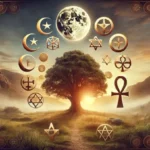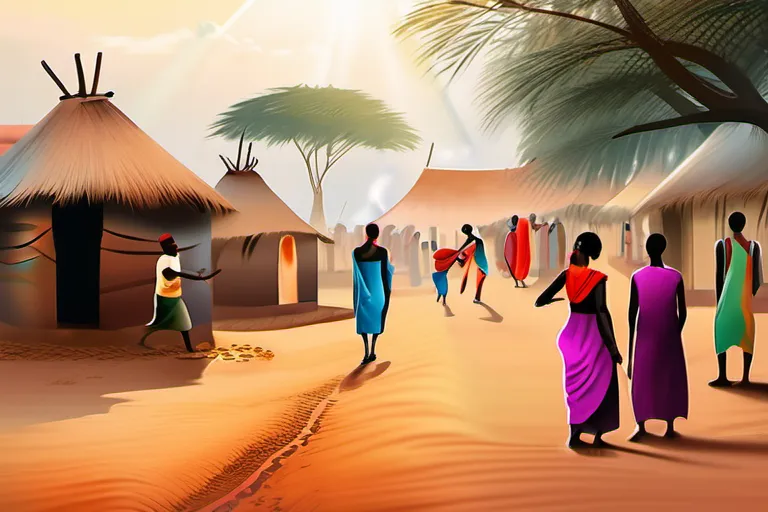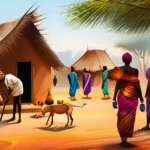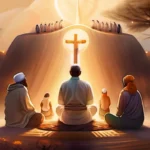Explore the beliefs, practices, and diversity of African traditional religions in this detailed article.
African traditional religions are rich and diverse, reflecting the unique cultural heritage of the continent. In this article, we delve into the various aspects of these religions, providing a comprehensive overview for readers.
The Basics of African Traditional Religions
Imagine Africa’s traditional religions as a vast, intricate tapestry woven with threads of belief and practice that span across thousands of years and diverse cultures. These religions, often referred to as indigenous African religions, offer a profound insight into human spirituality and community life. But what exactly do these religions encompass? And how do they differ from one another?
At their core, African traditional religions are deeply rooted in the idea that the natural world is inhabited by spirits or deities who can influence daily life. These beliefs often revolve around the concept of a supreme being, but also include myriad lesser gods and spirits that govern various aspects of nature, human society, and the cosmos.
These spiritual entities are believed to be integral parts of everyday life, interacting with humans through rituals and ceremonies. For instance, in many traditional African societies, rain is seen not just as a natural phenomenon but also as a manifestation of the divine, worshipped in elaborate ceremonies to ensure its timely arrival. This interconnection between the sacred and the profane underscores the holistic nature of these religions.
Another fundamental aspect is initiation rites. These rituals serve multiple purposes: they mark life transitions such as birth, coming-of-age, marriage, and death; impart moral teachings and societal values; and prepare individuals for their roles within the community. Initiation rites often involve symbolic acts that connect the initiate to spiritual forces, making them part of a larger cosmic order.
While these religions share some commonalities, it’s crucial to recognize their immense diversity. Each ethnic group in Africa has its own unique traditions and practices, shaped by local environments, historical experiences, and cultural identities. This variety reflects the rich tapestry of African cultures, where each thread adds depth and complexity to the whole.
Understanding African traditional religions requires us to delve beyond surface-level beliefs and explore the profound impact they have on individuals and communities. It’s a journey into the heart of human spirituality, where gods, nature, and people are in constant dialogue, creating a vibrant tapestry of life and belief.
Ancestor Worship in African Traditional Religions
Ancestor worship is at the heart of many African traditional religions, acting as a bridge between the living and the dead. How do these spiritual beings influence our daily lives? Why are they considered so vital in community rituals and ceremonies?
Think about it: Ancestors are like silent guides, watching over us from another realm. Their wisdom is passed down through generations, shaping our behavior and beliefs.
In many African traditional religions, ancestors are seen as powerful intermediaries between the living and the divine. They are believed to have a significant role in maintaining social order, protecting communities, and ensuring prosperity. How can such powerful figures fail to command respect?
- Protection: Ancestors are often invoked for protection against evil spirits and harm.
- Luck and Prosperity: They are also believed to influence luck in various aspects of life, from business to personal relationships.
- Social Harmony: Ancestors play a crucial role in maintaining social harmony by reminding the living of their duties and obligations within the community.
The rituals surrounding ancestor worship vary widely across different regions. In some cultures, offerings are made daily at family altars, while in others, major ceremonies are held during significant life events like weddings or births. How can these diverse practices coexist under one roof of reverence and respect?
Imagine a community coming together to honor their ancestors with songs, dances, and feasts. It’s not just about remembering the past; it’s about strengthening bonds for the future.
The role of ancestor worship extends beyond personal spirituality into the fabric of societal life. It reinforces social structures, cultural identity, and a sense of continuity through generations. How can this practice be so deeply intertwined with the very essence of African traditional religions?
Animism: The Spiritual Connection with Nature
Imagine stepping into a dense African forest, where every tree whispers ancient secrets and each stone holds untold stories. In many traditional African religions, this forest isn’t just nature; it’s a living, breathing entity connected to the spiritual world. This belief is at the heart of animism, a concept that sees spirits or souls (or nyama) in everything around us, from rivers and mountains to rocks and animals.
Animism creates a profound link between humans and nature, making the natural world an integral part of religious practice. For instance, consider how people might pray to a particular tree for its wisdom or protection. In many African cultures, this tree becomes more than just a plant; it’s a living ancestor, capable of offering guidance and healing.
But animism isn’t merely about reverence for nature—it’s also a way of life. Traditional healers often draw their knowledge from the natural world, using herbs and plants to treat illnesses in a holistic manner that respects both the body and its environment. This connection extends beyond health; it shapes how communities approach agriculture, conservation, and even social structures.
How do these beliefs manifest in everyday life? Take a day in the village where every morning begins with offering prayers to the river for clean water and bountiful catch. Or imagine a ceremony where people dance around a sacred rock, honoring its spirits for bringing rain and fertility. These practices are not just rituals; they’re vibrant expressions of a deep spiritual bond with nature.
Understanding animism in African traditional religions means recognizing that this belief system is as complex and diverse as the continent itself. Just like the intricate patterns on a Zulu shield, each culture’s approach to animism is unique, reflecting its history, environment, and values. By exploring these beliefs, we uncover not just spiritual practices but also profound insights into how different communities find meaning in their surroundings.
The Role of Shamans in African Traditional Religions
The role of shamans in African traditional religions is akin to that of a key player in an orchestra, guiding and harmonizing the complex symphony of life. How do they navigate through the intricate layers of spiritual beliefs and practices? Shamans are often seen as intermediaries between the human world and the divine realms, acting as bridges for communication with ancestors and spirits.
Imagine walking in a dense African forest where every tree whispers secrets and stones hold ancient wisdom. The shaman, like a skilled guide, helps navigate these mystical landscapes, interpreting the language of nature and deciphering the messages from the otherworldly entities. They perform rituals to seek guidance, heal ailments, and ensure the community’s well-being.
How do shamans achieve this extraordinary connection? Through trance-like states, they enter a heightened awareness that allows them to communicate with spirits. These sessions often involve singing, dancing, or even consuming hallucinogenic substances, creating an altered state of consciousness where they can venture into the spirit world.
The community’s trust in the shaman’s abilities is paramount. They are revered for their knowledge and wisdom, often consulted during significant life events such as births, marriages, and deaths. Their role extends beyond healing; shamans also play a crucial part in maintaining social order, resolving disputes, and offering advice that balances individual needs with communal harmony.
Consider the shaman’s journey: they are not just healers but also custodians of culture, preserving ancient knowledge and traditions. In many African communities, their influence is immense, shaping the very fabric of society by embedding spiritual practices into daily life. How can we fully appreciate the depth of African traditional religions without understanding the profound role shamans play in connecting the living with the divine?
The Diversity of African Traditional Religions
Imagine stepping into a vast, colorful canvas where each stroke represents a different region and culture in Africa. Each brushstroke tells a unique story about African traditional religions, which are as diverse as the continent itself. From the animist practices that permeate West Africa to the intricate rituals of East African societies, these religious systems paint a rich tapestry of beliefs and practices.
Ancient Roots in Every Soil—Just as the soil in different parts of Africa varies, so do its religious landscapes. In Nigeria, for instance, Ede Oba (ancestral worship) is deeply intertwined with Yoruba culture, while in Senegal, Piété Islamique and Sufism blend traditional Islamic beliefs with indigenous practices. Each region’s religion reflects the local environment, history, and social dynamics.
The Dance of Traditions—Across Africa, traditional religions often incorporate dance, music, and drama to express spiritual experiences. In Zulu tradition in South Africa, the Nguzo Saba (Seven Principles) are celebrated through storytelling and ritual, reflecting a complex interplay between religion and community life.
Multiplicity of Spirits—The diversity also lies in the multitude of spirits worshipped. In some regions, spirits might be seen as benevolent protectors or malevolent entities, while others might embody natural phenomena like rivers or mountains. These beliefs shape not only religious practices but also daily life and community norms.
The intricate web of African traditional religions is a living, breathing entity that adapts to its environment much like a vibrant ecosystem. Just as each leaf on a tree has its unique function, so too do the various practices in these religions serve specific roles within their communities. Whether it’s through ancestor veneration, healing rituals, or festivals celebrating nature, these traditions provide a rich framework for understanding and navigating life.
As we explore the diversity of African traditional religions, we uncover not just a series of beliefs but a profound way of life that continues to thrive in an ever-changing world. Each religion offers insights into human nature and our relationship with the divine, making them invaluable sources of wisdom and inspiration.
Modern Influences on African Traditional Religions
How do you define African traditional religions? Are they just remnants of the past, or are they dynamic belief systems that continue to evolve? In today’s interconnected world, these religions have been profoundly influenced by globalization and Christianity, leading to a fascinating transformation in their practices and beliefs. Can we still say that African traditional religions remain isolated pockets of cultural heritage, or are they now part of a broader global tapestry?
Globalization has brought people from different continents closer together, exposing them to various cultural exchanges. In this context, African traditional religions have not remained untouched. For instance, the rise of internet connectivity and social media platforms has allowed practitioners to share their beliefs with a wider audience. This exposure can either strengthen traditional practices or lead to syncretism—where traditional beliefs mix with other religious influences.
Take, for example, the case of Vodun in West Africa. While it remains a central part of many communities’ lives, there is now a growing influence from Christianity. Some practitioners have started integrating Christian elements into their rituals, creating a hybrid form that reflects both traditions. This process raises questions about identity and authenticity: are these new practices still African traditional religions in the strict sense?
Christianity too has had a significant impact on African traditional religions. Missionaries have spread across the continent for centuries, often leading to direct conflict or conversion attempts. However, what we see today is not just a clash of beliefs but an interesting blending. Many Christians still hold onto elements of their indigenous traditions while maintaining their faith in Jesus Christ. This syncretism has led to unique expressions of spirituality that blend old and new.
So, where does this leave us? Are African traditional religions merely adapting or fundamentally changing? The answer seems to be a bit of both. They are certainly evolving, influenced by the currents of globalization and the spread of Christianity. But their core elements—such as ancestor veneration, nature worship, and community rituals—remain deeply rooted in local cultures.
Conclusion
 From ancestor worship to animism, African traditional religions offer valuable insights into the spiritual lives of millions. By understanding these beliefs, we can appreciate the cultural richness and diversity of Africa.
From ancestor worship to animism, African traditional religions offer valuable insights into the spiritual lives of millions. By understanding these beliefs, we can appreciate the cultural richness and diversity of Africa.











